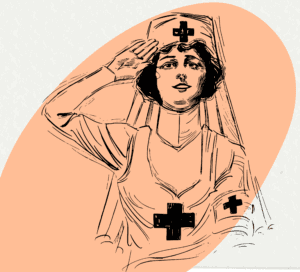Develop Your Future Through Licensed Nursing School
Date: September 8, 2022
Medical histories—were once housed in manila folders with protruding alphabetized tabs, standing like flags at full attention; each folder held a handwritten health history by one’s family doctor. A black dial phone, college-ruled Steno pad, carbon copy paper, and a home-drawn medical logo historically occupied space atop a medical receptionist’s aluminum desk. Once home to the tools of the trade, exam rooms showcased bedpans, heavy, black stethoscopes with cloth blood-pressure cuffs, and mercury-based thermometers.
Today Vs. Yesterday
While stethoscopes still accessorize scrub-wearers and blood-pressure cuffs come out, their real-life functions have been replaced by robotic machines; their cloth parts are swapped for disposable or touchless systems. The black phone and Steno pad, keeping appointments, have likely taken a back seat to computerized dropdown healthcare options and robocall reminders.
While the occasional paper file still exists–even collecting real-life dust–somewhere, most files have evolved to data access-sharing hosts–in the cloud. Even the receptionist, once doubling as the local health expert, with acumen in typing, bleaching floors, town gossip—and the keeper of waiting room magazines, is likely a Medical Assistant with formal training. Occasionally, they may even be an AI virtual assistant.
A Highly-evolved Modality
Yes! Healthcare is a highly-evolved modality. Nursing, too, is an ever-expanding industry meeting modern needs. So while another mercury thermometer finds its way to a local museum, let’s unpack what it means to be a current card-carrying member of the “Florence Nightingale Club” and what the term nurse means for those falling under the modern “nurse” moniker. Generally, today’s nurses have:
- More Education
- Technology Training
- Opportunities Beyond, Hospitals, Wars, or Doctors’ Offices
Today’s Nurse Has More Education
The term nurse applies to those trained within scopes of practice who have sat for and passed the NCLEX-PN/NCLEX-RN exam and obtained licensure. Whereby a Licensed Vocational Nurse (LVN) is an entry-level nurse responsible for rendering primary care within a directed scope of practice.1 The educational requirements for an LVN are either a diploma or an associate degree, and they practice under the direction of a Physician, Registered Nurse (RN), or other healthcare professional.2
While an RN is a higher-level of nurse. He or she has an associate or bachelor-level degree, has passed the NCLEX-RN Exam, is licensed by a state board of nursing, and practices a broader range of care.3
Early Nursing
Historically, nursing-type efforts were made by family or church deaconesses. Early on, training was not required.4 Later, most nursing education was done on the job, similar to hospital apprenticeships. Nurses formerly assisted doctors with mundane tasks that were less than medical but similar to household chores, such as helping patients eat, bathe, and get out of bed.5
“When training for nurses became more extensive, it required formal and extensive schooling. The education system started teaching nurses tasks originally reserved for physicians. This opened whole new fields for nurses.
More Advanced Roles
The allocation of duties freed physicians to concentrate on higher levels of education and gave nurses more decision-making and greater medical responsibilities for their patients.”4 Today, nursing degrees represent advanced education and training and can be earned at the associate, bachelor’s, master’s, and doctorate levels.
Today’s Nurse Has Technology Training
Nursing tools have evolved from tin bedpans and heavy hand-cranked beds to starched white uniforms and charting manually. Standard tools, once very manual, are now computer-based. Likewise, diagnostic monitors, split-second scanners, and touchless devices have taken over. According to NurseJournal, technology has changed nursing in some key areas, inclusive of:
Monitoring Point-of-care technology, digital monitors, and wearable devices provide ongoing patient vitals and other data. These decrease wait times, provide clinical decision support, and enhance education.6, 7, 9
Medicating. IV pumps and automated devices provide efficient and accurate administration of medication and fluids.6, 7
Electronic Health Records (EHR). These not only maintain databases of records but also provide nurses with quick access to critical information.6, 7
Technology Today Plays a Big Role in Nursing
Smart Beds. Not only do these allow furniture options, but electronic lift systems also allow quick transport. Smart beds help with monitoring movement and weight, prevent bedsores, and house nurse-call devices, etc.6, 7
Communication Devices. Headsets for team members and instant messaging provide for greater team coordination, reduced wait times, and more incredible speed for accessing test results, etc.6, 7
So intertwined is nursing technology nurses push computer laptops down healthcare corridors charting most reports digitally.
Today’s Nurse Has Opportunities Beyond Hospitals, Wars
Today’s nurses have management positions leading entire departments. They are administrators, educators, community healthcare professionals, and leaders serving in the public health sector. Nurses may work in oncology, orthopedics, cosmetics, or plastic surgery. Opportunities abound, from pediatrics to geriatrics, developmental disabilities to psychiatric and mental health. One may pursue interests in perioperative fields, informatics.
Even the sky isn’t the limit for today’s nurse. From pre-op to post-op, venues abound in home health companies, triage centers, inpatient facilities, outpatient facilities, specialty-care centers, and ER, nurses today have much autonomy. This healthcare person may work via telehealth, as a traveling nurse, or as a helicopter nurse.8 One may be a nurse practitioner, certified registered nurse anesthetist (CRNA), geriatric nurse, clinical nurse specialist, and more.
Conclusion
With so many new devices, today’s Zoom exams, plus the invention of My Chart, online nursing FAQs, and healthcare apps, it seems all healthcare is on a proverbial quest to mimic one’s favorite sci-fi movie. But it’s not from the future–it’s just nursing!
Find your future with Gurnick Academy today. Our admissions specialist should be able to answer your questions. Who knows? They might even recommend a local museum housing a vintage black phone, a Steno pad, and a mercury thermometer.~
Citations
1 “Licensed Vocational Nurse Scope of Practice.” Texas Board of Nursing, Texas.Gov. 2013. (Accessed Mar. 31, 2022.)
2 “Licensed Vocational Nurses.” Board of Vocational Nursing and Psychiatric Technicians (BVNPT). The state of California. 2022. (Accessed Mar. 15, 2022.)
3 “Definition of Nursing Terms.” NCSBN, National Council of State Boards of Nursing, Inc. 2022. (Accessed Mar. 15, 2022.)
4^a, b Ranard, Chelsy. “How Nursing Has Changed over Time–Minority Nurse.” Minority Nurse, Springer Publishing Company. Feb. 28, 2019. (Accessed Sept. 6, 2022.)
5 Rupp, Scott. “100 Years of Nursing–Electronic Health Reporter.” Electronichealthreporter.com, Electronic Health Reporter. July 10, 2020. (Accessed Sept. 6, 2022.)
6 ^a, b, c, d Writers, Staff. “How Technology Has Changed the Role of Nursing.” NurseJournal, Red Ventures, Oct. 26, 2021. (Accessed Sept. 7, 2022.)
7 ^a, b, c, d “10 Best Nursing Technologies for Improving Patient Care.” Gale Healthcare Solutions, Gale Healthcare Solutions, Feb. 24, 2021. (Accessed Sept. 6, 2022.)
8 Gaines, Kathleen. “What Are All the Types of Nurses? The Complete List of Nursing Careers and Specialties.” Nurse.org, Full Beaker, Inc. July 8, 2022. (Accessed Sept. 6, 2022.)
9 “Point of Care Technology.” Johns Hopkins Medicine, Johns Hopkins Medicine, Division of Infectious Diseases. (Accessed Sept. 7, 2022.)







